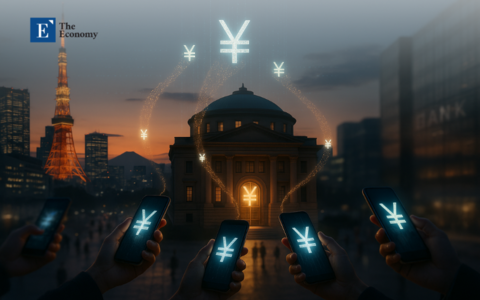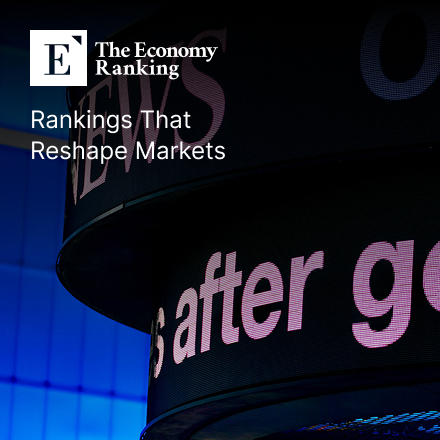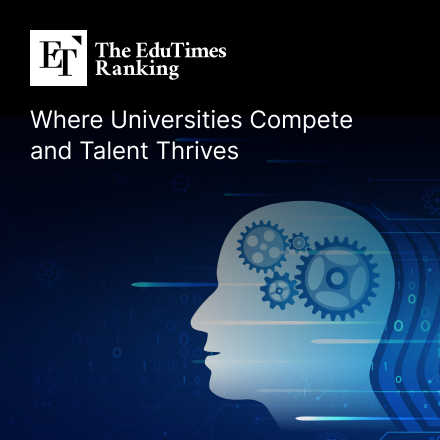Input
Changed
This article was independently developed by The Economy editorial team and draws on original analysis published by East Asia Forum. The content has been substantially rewritten, expanded, and reframed for broader context and relevance. All views expressed are solely those of the author and do not represent the official position of East Asia Forum or its contributors.
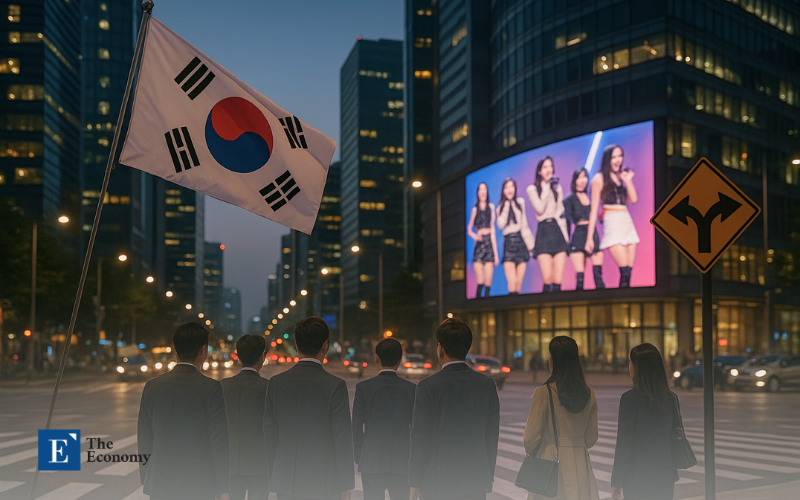
South Korea's official story of itself starts brilliantly: a war-scarred agrarian state becomes, within two generations, a technological and cultural dynamo. In the classroom, it is retold as a parable of discipline and innovation; on TikTok, it flashes past in high-definition choreography and neon-lit Seoul skylines. Yet the very clarity of that narrative is now generating a strategic blind spot. The nation's public-diplomacy machine has become so adept at amplifying the symbols of 'K-might' that it occasionally forgets to verify whether the substance has caught up. Pride framed as inevitability breeds a dangerous complacency: planners assume that anything stamped 'K-' will convert into global demand, while critics who point out evidence to the contrary risk social and professional excommunication. The paradox is stark: a country that rose by measuring everything—test scores, export ratios, patent filings—now flinches when asked to measure its soft-power impact with equal rigor. The urgency of recalibrating the thermometer of nationalism to show real temperature instead of desired temperature is paramount, as the celebrated K-brand could be overvalued when South Korea most needs international credibility.
The Illusion of Ubiquity
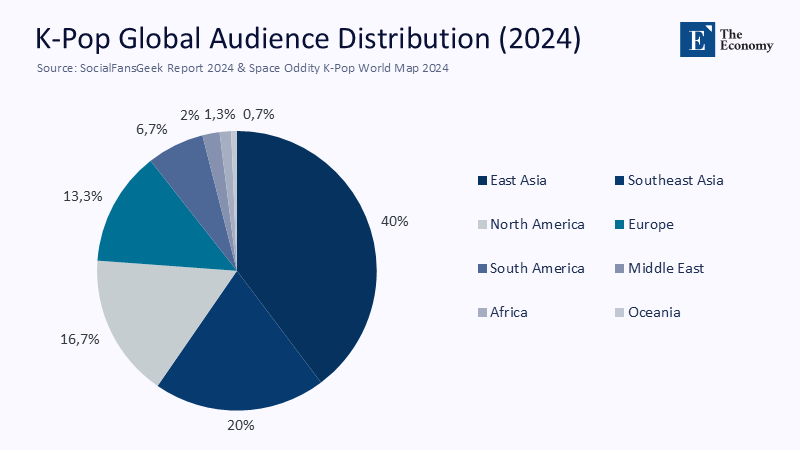
At the heart of the disconnect lies a statistical mirage: global audiences feel larger on a phone screen than on a spreadsheet. Last year, four Korean albums placed in the world's top ten sellers, a headline that ricocheted through local media as proof of mass cultural supremacy. However, social media scraping by analytics firm SocialFansGeek identified roughly 150 million self-identified K-pop fans, under two % of humanity and about one quarter of Spotify's active user base. Meanwhile, Space Oddity's 2024 "K-Pop World Map" reveals that more than 60 % of YouTube views for Korean music still originate within East and Southeast Asia. This geographic concentration belies the myth of universal reach. The Ministry of Culture's own Global Hallyu Survey lists the United States and Brazil among top fandom hubs, yet the share of respondents who consume Korean content weekly languishes below 10%. Put differently, Korean culture is resonant and fast-growing, but it is not yet the planetary lingua franca that domestic commentary routinely proclaims.
When Balance Sheets Reply to Hashtags
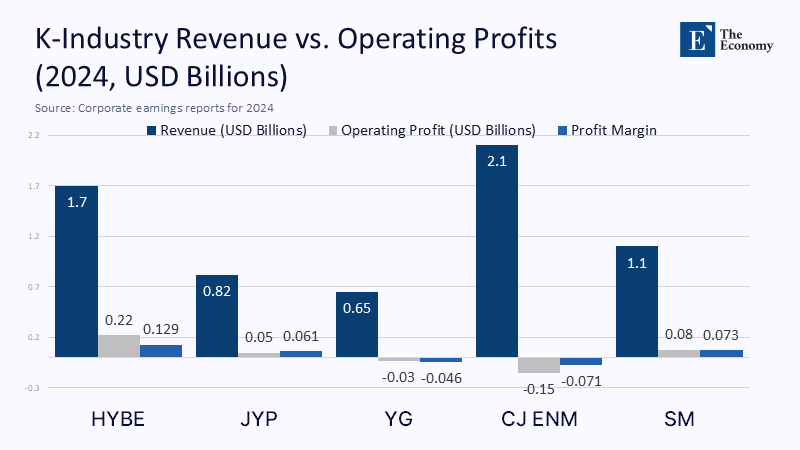
Corporate earnings are beginning to call the bluff. HYBE's 2024 revenue broke all company records at ₩2.2 trillion, yet operating profit slid 37.5 %, and the firm posted a rare net loss after aggressive overseas acquisitions misfired. JYP achieved its highest quarterly sales ever, but still watched its margin contract as concert expenses outpaced ticket demand in Europe. Once the avatar of hip-hop swagger, YG swung into an operating loss after album presales overestimated Western conversion rates. Streaming television tells the same tale: CJ ENM's ambition to turn TVING into an "Asian Netflix" required a 531 billion-won write-off that plunged the parent group into the red despite a 42 % revenue surge. Cosmetics, long the Hallyu auxiliary engine, grew in the United States but continued to contract in China, the largest market once presumed captive to K-beauty hype. In each case, multinational marketing budgets were drafted assuming that foreign consumers were already burned by K-brand desire; accountants are now quantifying the opportunity cost of that overconfidence.
Comparative Nationalist Playbooks—and Their Costs
Proponents of strategic boosterism invoke Meiji Japan's kokutai, Erdoğan-era Turkey's neo-Ottoman revival, or China's post-Olympic "Wolf Warrior" swagger to argue that a bit of chest-thumping is historically normal. Yet the cautionary data from those very cases tends to go unmentioned. Japan's Cool Japan Fund, hailed in 2013 as a ¥60 billion cultural-exports accelerator, has racked up cumulative losses of more than ¥30 billion and faces merger or dissolution unless profitability rebounds. British creative-industry subsidies operate at a healthier impact-per-pound ratio, moving roughly £8 of export value for each £1 of grant funding. By contrast, South Korea's cultural-promotion intensity reached an estimated 14 cents of public support for every export dollar in 2024, over 50 % higher than Japan's headline rate and nearly quadruple the UK's. If nationalism delivers diminishing marginal returns, Seoul is already traversing the steep portion of the curve.
The Price of Silence: Chilling Effects in a Digital Agora
The financial misreads might be corrected sooner if nationalist sanctions did not clog feedback loops. After President Yoon Suk-yeol's six-hour martial-law declaration in December 2024, entertainers who posted even neutral statements of concern faced coordinated advertiser boycotts and online smear campaigns orchestrated in ultra-conservative forums. A few months later, conservative bloggers urged followers to report K-pop icon IU to the U.S. Central Intelligence Agency because her mild criticism of the administration constituted foreign subversion—a spectacle equal parts comic and chilling. Academic conferences in Korean studies have reported double-digit session cancellations after presenters preview papers challenging the global-mania thesis. The result is a cultural sphere in which speaking plainly about soft-power limitations is reputationally hazardous, further entrenching data-light optimism inside bureaucratic echo chambers.
Metrics Matter: Why Data Hygiene Is Now Strategic
Soft power is not a beauty contest but a confidence game rooted in trust. Brand Finance's 2025 Global Soft Power Index ranks Korea twelfth worldwide, applauding its 'future growth potential' but flagging a 'trust deficit' relative to peers. That deficit happens when narrative speed outpaces verificatory infrastructure. For decades, Seoul's economic ministries published granular dashboards on export volumes, manufacturing capacity, and R&D spend—tools that enabled the industrial miracle. No equivalent dashboard exists for cultural exports. Instead, agencies rely on platform-provided vanity metrics such as trending hashtags or video-view counts, neither of which correlates cleanly with revenue or reputational capital. Worse, algorithmic amplification can create phantom demand: a viral dance challenge may rack up 200 million views in Brazil without indicating that 200 million Brazilians will buy albums, tickets, or cosmetics. The need for better metrics in evaluating cultural exports is crucial to ensure accurate measurement and understanding of the true impact of South Korea's soft power.
Re-engineering Public Diplomacy: Proposals for Evidence-First Pride
A corrective architecture would begin by moving responsibility for "K-stats" from the Culture Ministry to a joint task force that includes the Ministry of Foreign Affairs, the Science and ICT Ministry, and Statistics Korea. Quarterly public dashboards should triangulate proprietary platform data—Spotify territorial streams, TikTok hashtag velocity, Weverse merchandise-cart conversions—with randomized survey instruments that map affective sentiment. Funding for cultural-export projects could be tied to an impact-per-won ratio benchmarked against comparable programs in Japan, the UK, and China; subsidies that cannot show a projected 10:1 return within two years would automatically trigger an external audit. Parallel reforms in higher education could weave media-literacy modules into first-year orientation, training the next generation to parse algorithmic hype from representative sampling—essential if future diplomats and marketers are to avoid the same illusions.
Hard Metrics Worth Bragging About
Re-balancing narrative and fact does not mean dimming Korea's glow; it simply means shining the light on assets that withstand scrutiny better than trending charts. In PISA 2022, Korean fifteen-year-olds ranked third in mathematics, fourth in science, and seventh in reading among eighty-one economies, widening their lead over the OECD mean as most rich nations slid. The country files more triadic patents per capita than Germany and the United Kingdom combined, and its semiconductor fabs produce chips integral to every cloud-computing cluster announced this decade. K-cinema remains the only non-English-language ecosystem to win the Cannes Palme d'Or and the Academy Award for Best Picture within the same four-year window, translating cultural prowess into institutional prestige rather than mere clicks. These are bragging rights rooted not in projection but in performance—assets that can anchor a long game of influence.
The Opportunity Cost of Overstatement
Conventional wisdom holds that hype costs nothing. The ledger says otherwise. HYBE's acquisition of Atlanta-based QC Media for $350 million was justified internally by seamless fan-base overlap; eighteen months later, the unit contributed less than 2 % to group revenue and incurred restructuring charges. CJ ENM's aborted plan to buy Los Angeles-based Fourth Wall Studios collapsed after due diligence revealed weaker-than-advertised demand for Korean scripted content in ad-supported streaming niches. Each misstep diverts capital from sectors where Korea enjoys uncontested comparative advantage—battery chemistry, renewable-energy hardware, artificial-intelligence semiconductors—areas that could reinforce strategic alliances if nurtured. Cultural diplomacy is valuable, but it should not cannibalize resources from industries that anchor the very technological brand South Korea seeks to promote.
A Bigger, Bolder Truth
National pride birthed the South Korean miracle; precision nurtured it. The next phase of the republic's soft-power journey will require reuniting those twins. Pride without measurement risks inflating a bubble of expectations that foreign partners can increasingly cross-check; measurement without pride risks sapping the emotional energy that propels creative ambition. The answer is neither self-flagellation nor cheerleading but a disciplined optimism—confidence grounded in evidence, strategy guided by dashboards rather than decibels. If Seoul builds that apparatus now, it will protect the K-brand from the deflationary spiral of hype fatigue and model for other mid-sized democracies an alternative to the zero-sum swagger of great-power propaganda. South Korea can still write the handbook on twenty-first-century cultural statecraft—provided it remembers the lesson it once taught the world: progress begins the moment you dare to compare the story you tell yourselves with the numbers that tell the truth.
The original article was authored by Myojung Chung, an Assistant Professor of journalism and media innovation at Northeastern University. The English version, titled "South Korea needs public diplomacy strategies to separate K-fact from K-fiction," was published by East Asia Forum.





